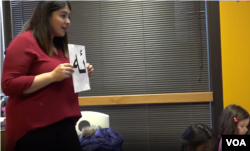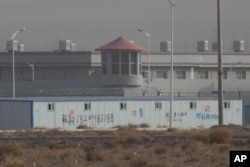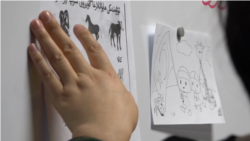Irade Kashgary carefully passes out small pieces of colorful clay to her five young students. Their assignment, Kashgary explains, is to form the clay into the shapes of letters.
The students roll the clay in their small hands, bending it to make the letter “A.” They compare their results with each other, and laugh with excitement.
Kashgary’s three- and four-year-old students are all Uyghur-Americans. They are not learning the letters of English. They are learning Uyghur, a Turkic language spoken by more than 11 million ethnic Uyghurs in western China.
Every Sunday, about 60 young Uyghurs come to Ana Care Education in northern Virginia to study their mother tongue. “Ana” means “mother” in the Uyghur language.
Kashgary, who is 24, opened Ana Care in 2017 with her mother, Sureyya. The small school offers language, culture and Islamic religion classes.
“We decided to open a Uyghur school here in northern Virginia, in Fairfax, Virginia, because it does have one of the largest populations of the diaspora in this area. And it really is a need.”
Kashgary herself was born in China’s Xinjiang Uyghur Autonomous Region, and moved with her parents to the United States when she was a child. Xinjiang is a huge, resource-rich area in the country’s west. It shares a border with eight countries, including Pakistan, Russia and Afghanistan.
About 11 million Uyghurs live in Xinjiang, which means “new frontier” in Mandarin Chinese. Like many Uyghurs who live overseas, Kashgary calls the area East Turkestan. They consider their homeland to be occupied by China.
The Uyghur language and culture are closely related to Turkish, Uzbek, Kazakh and other Turkic groups. Today, Uyghurs use an Arabic-based writing system.
A police state
In the two years since Ana Care opened, China has effectively turned Xinjiang into a police state, with block-by-block security checkpoints, spy cameras and detention centers that China has called “re-education camps.”
China says it is trying to prevent Islamic extremism and separatism among Uyghurs, who are mostly Muslim. It describes the camps as “vocational training centers.”
But rights groups and experts have used phrases like “Chinese gulags” and “concentration camps” to describe the Xinjiang camps. Some Uyghur-Americans call them "brainwashing centers."
Experts say more than 1 million people are detained in camps across Xinjiang. Among them are well-known Uyghur cultural leaders, professors, musicians and writers.
A disappearing language
Former detainees have said they were forced to renounce their way of life, religion and their native language inside the camps. Some have even said that using or studying the Uyghur language was the reason for their detention.
Darren Byler is a social scientist and Uyghur specialist at the University of Washington. In a recent piece for the website SUPChina.com, he wrote that any state employee who speaks Uyghur in public is now considered to be “two-faced.”
“This is a charge that has resulted in the detention of hundreds, if not thousands, of Uyghur public figures,” Byler wrote.
Xinjiang’s regional policy states that both Mandarin Chinese and Uyghur are considered official languages. But in cities across the area, the Uyghur language is disappearing.
Recorded images show Uyghur words being removed from business and street signs. Observers say bookstores that once offered large collections of Uyghur literature now have “zero” Uyghur books on their shelves. There have even been reports of large-scale burning of Uyghur books.
Recent education restrictions mean that Uyghur children are no longer permitted to study in their mother tongue. Uyghur language teachers in Xinjiang have no one to teach.
One Uyghur woman living in the United States told VOA that her sister taught Uyghur literature classes in Xinjiang’s public schools for many years. Today, her sister is required to teach the “national language” – Mandarin Chinese – to detainees inside a camp.
‘I’m lucky I am in the U.S. so I can learn Uyghur’
Back in northern Virginia, 17-year-old Nadina pays close attention as her teacher goes through another set of letters in Uyghur. Nadina attends Ana Care’s weekly class for older students who can speak the language but cannot read it.
“I’m trying to learn the Uyghur alphabet and a lot of other things – speech, pronunciation…”
Nadina believes that she and other overseas Uyghurs have a special responsibility to learn their language as best as they can.
“Because the Chinese government currently is trying to….get rid of almost our existence, as a culture, and trying to change everyone to make them speak Chinese and not speak our mother tongue anymore. So I think it’s very important now that we learn the language and continue on so it never gets erased.”
Kurshat Bilgen is another Ana Care student. He is 10 years old and in fifth grade. He has been studying Uyghur language and culture for two years. He says he feels “lucky” to be able to study his language.
“I come here to learn Uyghur because back in East Turkestan, people are not allowed to learn Uyghur. So I’m lucky I am in the U.S. so I can learn Uyghur.”
‘Being a Uyghur is a crime’
Nadina and Kurshat’s teachers at Ana Care did not wish to appear on camera or use their names. Even more than 10,000 kilometers away from China, they do not feel fully safe. Most still have parents or other family back home. They believe that media reports showing them teaching Uyghur in America would put their families in danger.
Kashgary says she is extremely grateful for the teachers’ language expertise. And she is happy that Ana Care has given them another chance to do what they love.
“Our teachers, a lot of them got a great education in Uyghur, back in East Turkestan, and because of the current climate there, they had to leave. And when they immigrated here, they didn’t necessarily have a platform to continue teaching Uyghur. So this has given them an opportunity to continue with their profession.”
One Uyghur-American mother who wished to not use her name said she brings her two young children to Ana Care each Sunday. She told VOA that what Ana Care Education offers its community should not be considered unusual.
She said, “The very simple thing about learning our own native language, like many communities in the United States, it’s a very normal thing to do. But for us, it’s a crime. It’s a crime to learn your own language. It’s a very political thing. And that’s sad.
“Being a Uyghur is a crime now.”
I’m Ashley Thompson.
I’m Caty Weaver.
Ashley Thompson wrote this story for VOA Learning English. Caty Weaver was the editor. Dorothy Gundy produced the video.
_______________________________________________________________
_______________________________________________________________
Words in This Story
clay - n. a heavy, sticky material from the earth that is made into different shapes and that becomes hard when it is baked or dried
diaspora - n. a group of people who live outside the area in which they had lived for a long time or in which their ancestors lived
frontier - n. a border between two countries
vocational - adj. relating to the special skills, training, etc., that you need for a particular job or occupation
gulag - n. a system of labor camps in the Soviet Union from 1930 to 1955 in which many people died.
concentration camp - n. a type of prison where large numbers of people who are not soldiers are kept during a war and are usually forced to live in very bad conditions
brainwash - v. to cause (someone) to think or believe something by using methods that make a person unable to think normally
alphabet - n. the letters of a language arranged in their usual order
get rid of - phrasal verb. to do something so that you no longer have or are affected or bothered by (something or someone that is unwanted)
erase - v. to remove any thought or memory of (something)
platform - n. something that allows someone to tell a large number of people about an idea, product, etc.
opportunity - n. an amount of time or a situation in which something can be done











